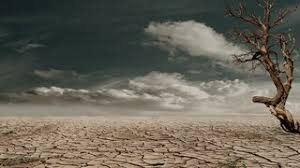Judah’s Terrible Drought
14: 1-6
Judah’s terrible drought DIG: Why was drought such a devastating thing to ADONAI’s people? Why did this drought came about? How did it happen? All at once? In waves of successive years? Or what? What does it say about the seriousness of their sins that YHVH chose to speak to His people about droughts through Yirmeyahu? At what point did God’s patience finally run out? Does His patience have a limit?
REFLECT: As a parent, as a friend, as an employee, as a spouse, is there a time when your patience runs out? What happens? Are you going through a season of drought in your life right now? How did you get in that dry cistern? How do you get out? What keeps you going during those tough periods? How can you help others?
608 BC during the eleven-year reign of Jehoiakim
Unlike the land of Egypt, whose food supply depended on irrigation from the Nile River, the land of Canaan depended on the rains God sent from heaven (Deuteronomy 11:10-12). If His people obeyed His Torah, YHVH would send the rains and give them bumper crops (Leviticus 26:3-5), but if they disobeyed, the heavens would become like bronze and the earth like iron (Leviticus 26:18-20; Deuteronomy 11:13-17, 28:22-24). Over the years, Y’hudah’s sins had brought a series of droughts to the Land (see 3:3, 5:24, and 12:4), and Yirmeyahu used this painful but timely topic as the basis for a sermon to the people.136
This is the word of ADONAI that came to Jeremiah concerning the droughts (14:1); The Hebrew word for drought here is in the plural. The emphasis is that there was not one massive drought, but a series of droughts. This was consistent with the teachings of the Torah. There were blessings for obedience and curses for disobedience. Among the curses listed was the fact that if Isra’el disobeyed there would be drought (Leviticus 26:19-20; Deuteronomy 11:17, 28:23-24). Apparently this was a series of droughts so severe that it left a lasting impression on the Judeans.

The effects of this prolonged drought are vividly portrayed by four brief staccato announcements: Judah mourns . . . her cities and her inhabitants languish . . . they wail for the Land . . . and a cry goes up from Jerusalem (14:2). The people were in tears. But it was rather the cry of their trouble, and of their sin, than of their prayer. The severity of the drought was evidenced in that it not only touched the common people, but even the nobles who always had the best water supply. The nobles send their servants for stored water; they go to the cisterns but found no water. There are numerous pits or cisterns still to be found in Palestine. They are often hewn out of the solid rock, and, being narrower at the mouth than at the bottom, it is not an easy thing to get out unaided, if one should be so unfortunate as to get in. When dry, these cisterns were sometimes used as dungeons for prisoners, and so Joseph’s brothers put him in one (Genesis 37:20). Jeremiah was also imprisoned in a cistern that had been dug in the courtyard of the guard (to see link click Fz – Jeremiah Thrown into a Cistern).137
The servants return (shuwb) with their jars unfilled; dismayed and despairing, ashamed . . . covering their heads is a sign of great distress (14:3). Those who rejected the spring of Living Water of life for false cisterns now found their physical water supply matching the spiritual water supply to which they had turned (2:13).138
Yirmeyahu then described the effect of drought on the farmers: The ground is cracked because there is no rain in the Land; the farmers are dismayed and cover their heads as they watched their crops waste away (14:4).
In the drought even the wild animals were desperate. This is a significant detail. Domestic animals were close to waterholes and pasturelands. The drought is almost total when the wandering animals also cannot find any water.139 Even the doe in the field deserts her newborn fawn because there is no grass. The animal kingdom also suffered greatly. Wild donkeys (who can survive on practically nothing) stand on the barren heights close to death and pant like jackals through the heat and thirst; their usually good eyesight failed them as they looked for food (14:5-6).
At another level, this word of God was being passed along to the readers of the text in Babylon. By the time they had read these words, Jerusalem had already fallen and they were in exile. So they could look back on these disastrous events and be given a new glimpse of how YHVH had responded to their rebellion. To see how ADONAI lamented (14:17-18) over His actions would help shape their continuing understanding of His heart. Divine judgment is accompanied by grief; such devastation was not what Ha’Shem wanted for either the people, the Land, or the animals.140
The drought tore at the social fabric of the nation. Everything came to a screeching halt because now nobles, farmers, cows, does, wild donkeys and jackals all had something in common. The pall of death hung over the nation. The prophet from Anathoth realized that this judgment of the droughts was a direct result of the sins of Y’hudah. It was just the beginning and the worst was yet to come. He had come to the conclusion that Jerusalem’s judgment was inescapable – as we see next.



Leave A Comment